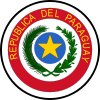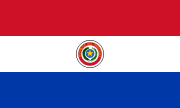Fernando Lugo
| Fernando Lugo | |
.jpg) |
|
|
President of Paraguay
|
|
| Incumbent | |
| Assumed office 15 August 2008 |
|
| Vice President | Federico Franco |
|---|---|
| Preceded by | Nicanor Duarte |
|
|
|
| Born | 30 May 1951 San Solano, Paraguay |
| Political party | APC |
| Children | Guillermo Armindo Lugo Carrillo (b. 2007) |
| Religion | Roman Catholic |
Fernando Armindo Lugo Méndez (Spanish pronunciation: [ferˈnando arˈmindo ˈluɣo ˈmendeθ]; born May 30, 1951) is the current President of Paraguay and the former Roman Catholic bishop of the Diocese of San Pedro.
Contents |
Early life and history with the Church
Lugo's family was not particularly religious; by his own account, he never saw his father set foot in a church. However, the influences during his upbringing were distinctly political. His maternal uncle Epifanio Méndes Fleitas was a Colorado Party dissident and was persecuted and exiled by General Stroessner's regime. Lugo's father was imprisoned twenty times, and some of his elder siblings were sent into exile. He received his basic education at a religious school in Encarnación, all the while he worked selling snacks on the streets.
At age 17 or 18, against his father's wishes of him becoming a lawyer, Lugo entered a normal school, and began teaching at a rural community. He was well accepted within this people, who were very religious, but they had no priest. He recalls that he was touched by that experience, discovering his vocation to the Roman Catholic priesthood, and he decided to enter a seminary operated by the Society of the Divine Word at age 19. Lugo was ordained a priest on August 15, 1977. That year he was sent to Ecuador, where he served as a missionary for five years. In Ecuador he had the opportunity to learn about the controversial Liberation theology, a movement later criticized in large measure by the Vatican.
Lugo returned to Paraguay in 1982, and after a year, the regime's police asked Church authorities that he be expelled from the country. The Church complied and sent him to Rome for further academic studies. Lugo returned to Paraguay in 1987, two years before the Stroessner dictatorship's ultimate fall. Lugo was ordained a bishop on April 17, 1994, and received charge of the nation's poorest diocese, in the San Pedro department.[1]
Lugo resigned as ordinary of the Diocese of San Pedro on January 11, 2005. He had requested laicization in order to run for office. However, the Holy See refused the request on the grounds that bishops could not undergo laicization, and also denied him the requested canonical permission to run for civil elected office.[2] Subsequently, following his swearing-in as President, the Church granted the laicization.[3]
| Paraguay |
 This article is part of the series: |
|
|
|
|
Other countries · Atlas |
Presidential candidacy
| “ | Without doubt it is possible to resurrect a country like Paraguay. We are people of hope, of faith, and I won't be the one killing that hope of the people. I do believe we will resurrect this country, a country deeply drowned in misery, poverty and discrimination. Because I do believe Paraguay could be different. I do not lack faith in this flock. Where there is a scream coming from the poor people, where there is sweat, where people are shoeless, we will be there. Because in such people there is a resurrection; if that exists there, then there is resurrection for Paraguay. | ” |
|
— Fernando Lugo [4]
|
Lugo jumped to the national arena by backing peasants' claims for better land distribution. During 2006, wide-spectrum opinion polls published by Diario ABC Color newspaper showed him as a possible choice for the opposition's presidential candidacy. Known as "the bishop of the poor", Lugo was seen in the subsequent months as the most serious threat to the dominance of the Colorado Party on Paraguayan politics. Although he has said he finds the presidency of Hugo Chávez in Venezuela interesting, he has also made a point to distance himself from leftist leaders in Latin America, focusing more on social inequality in Paraguay. On February 23, 2007, a Prensa Latina article noted that the Paraguayan Interior Ministry offered Lugo protection because of the death threats he has received during the course of his political activities.[5]
According to a poll released in February 2007, he was the leading contender in the April 2008 presidential election, with more than 37% of the voters' intention.[6] On October 29, 2007, he registered himself into the tiny Christian Democratic Party of Paraguay in order to get his bureaucratic habilitation to run for office.[7] That party integrated a coalition of more than a dozen opposition parties and social movements, named Patriotic Alliance for Change. Federico Franco, from the center-right Authentic Radical Liberal Party, Paraguay's largest opposition party, was his running mate.
Even though on November 16, 2007, the Chairman of the National Republican Party (ANR, Partido Colorado), then-sitting President Nicanor Duarte Frutos, announced that the Colorado Party would not initiate any proceedings to block Lugo's candidacy,[8] there is a debate going on about its legality, because Article 235 of the Constitution forbids ministers of any religious denomination to hold elective office,[9] and Pope Benedict XVI rejected Lugo's resignation from the priesthood.[10] In July 2008, however, the pope downgraded Lugo to layman's status in order to allow him to assume the presidency without violating church rules.[11]
On April 20, 2008, Lugo won the election by a margin of 10 percentage points, although far short of a majority. The Colorado Party candidate, Blanca Ovelar, acknowledged that Lugo had an unassailable lead and conceded the race that same night at about 9 p.m. local time. Two hours later, President Duarte acknowledged that the Colorados had lost an election for the first time in 61 years. Lugo became Paraguay's second leftist president (the first being Rafael Franco, who served from 1936 to 1937), and the first to be freely elected. Also, his swearing in marked the first time in Paraguay's history (the country gained independence in 1811) that a ruling party peacefully surrendered power to an elected member from the opposition.
Lugo was sworn in as President on August 15, 2008. He said that he would not accept the presidential salary because it "belongs to more humble people" and encouraged other politicians to refuse their salaries as well.[12]
On August 18, 2008, Lugo named Margarita Mbywangi, a member of the Aché indigenous ethnic group, as minister of indigenous affairs, the first indigenous person to hold such a position in Paraguay.[13]
During the campaign, Lugo had suggested that he would switch diplomatic relations from the Republic of China (or Taiwan) to the People's Republic of China,[14] thereby depriving the ROC of its last diplomatic ally in South America. However after the inauguration, which had been attended by President Ma Ying-jeou from Taiwan, Lugo stated that he had no plans to switch recognitions.[15]
Personal life
Since Lugo is not married, he announced the designation of his elder sister, Mercedes Lugo, as First Lady of Paraguay.
In August 2010 Lugo was diagnosed with non-Hodgkin's lymphoma, a form of cancer. He will continue his duties as president of Paraguay while undergoing treatment.[16]
2009 paternity controversy
On April 13, 2009, Lugo admitted he is the father of a child conceived with Viviana Carrillo, age 26, while he was still a Roman Catholic bishop. The revelation came five days after lawyers for Ms. Carrillo announced they were filing a paternity suit against the President. Ms. Carrillo's lawyers say the boy was born on May 4, 2007. Pope Benedict XVI did not relieve Lugo from his vows of chastity until July 31, 2008.[17][18] A minor judicial investigation ensued as it was claimed that the woman was under 18 years old when the relationship started. Nothing was proven.
One week later, a second woman, Benigna Leguizamón, came forward in Paraguay alleging that President Fernando Lugo fathered one of her children in 2002 when he was serving as a Catholic bishop.[19] However, Lugo did not acknowledge this child as in the first case. Leguizamón then filed a lawsuit against the President demanding a DNA test.[20] Other Paraguayan bishops were reportedly informed of such allegations in 2004, but did not make them public at the time.[21] A third woman, pro-government political activist Hortensia Morán, appeared a day after Leguizamón and also claimed President Lugo is the father of her child — this one a 16-month-old boy she claimed she named after late Pope John Paul II.[22] Initially she waited for Lugo's spontaneous recognition of her child, but as this didn't happen after seven months, Morán became the third woman to sue the President.[23]
Blog
Lugo began writing a blog on the web site of newspaper ABC Color in March 2007.[24]
References
- ↑ "Interview with Fernando Lugo, by César Sanson for Agência Brasil de Fato"
- ↑ Documento sin título
- ↑ "Paraguay's president, ex-bishop, granted lay status". Catholic World News. 2008-07-30. http://www.cwnews.com/news/viewstory.cfm?recnum=59958. Retrieved 2008-07-31.
- ↑ "Rise of the Red Bishop" The Guardian Weekly, August 14, 2008
- ↑ Paraguayan Gov't Offers Lugo Protection
- ↑ Angus Reid Consultants
- ↑ "El ex obispo Fernando Lugo se afilió al Partido Demócrata Cristiano" (in Spanish). ABC Digital. 2008-05-31. http://www.abc.com.py/articulos.php?pid=368460.
- ↑ Catholic World News : Suspended bishop cleared as presidential candidate in Paraguay
- ↑ "Paraguay Constitution". International Constitutional Law Project of the University of Bern. http://www.servat.unibe.ch/law/icl/pa00000_.html. Retrieved 2008-04-21.
- ↑ "Impugnación de Lugo será tratada por el comité ejecutivo de la ANR", abc.com.py (Spanish).
- ↑ "Paraguay: Special Dispensation for President-Elect". The New York Times. 2008-07-31. http://www.nytimes.com/2008/07/31/world/americas/31brief04.html.
- ↑ "Latin America's left wing swells with new Paraguay president", AFP, August 15, 2008.
- ↑ ""The Bishop of the Poor": Paraguay's New President Fernando Lugo Ends 62 Years of Conservative Rule". Democracynow.org. http://www.democracynow.org/2008/8/19/inauguration_of_paraguays_new_president_fernando. Retrieved 2010-01-05.
- ↑ "Search - Global Edition - The New York Times". International Herald Tribune. 2009-03-29. http://www.iht.com/articles/ap/2008/04/22/america/LA-GEN-Paraguay-Lugo.php. Retrieved 2010-01-05.
- ↑ "View". redOrbit. http://www.redorbit.com/news/business/1523297/taiwan_president_attends_inauguration_of_paraguayan_president/index.html. Retrieved 2010-01-05.
- ↑ "BBC News: Paraguay President Fernando Lugo diagnosed with cancer". http://www.bbc.co.uk/news/world-latin-america-10900677.
- ↑ "The Globe & Mail". http://www.theglobeandmail.com/servlet/story/RTGAM.20090413.wparaguay_pres0413/BNStory/International/home.
- ↑ (PDF) Point. Metro. http://metropoint.metro.lu/20090414_Toronto.pdf.
- ↑ Woman claims Paraguay prez fathered her child, too
- ↑ Paraguay Paternity Fiasco
- ↑ Bishop: Church knew Lugo allegedly fathered kids
- ↑ Woman: Paraguay's Lugo has 3rd child: John Paul
- ↑ "Attorney Rodrigo Aguilar announced: This Monday Lugo will be notified of lawsuit against him." ABC Color, November 9, 2009.
- ↑ ABC Blogs - Asunción - Paraguay
External links
- Fernando Lugo on Catholic Hierarchy
- Feb. 27, 2007 New York Times article on Lugo's possible candidacy
- Feb. 22, 2007 article on Lugo from Worldpress.org
- Dec. 30, 2006 Daily (Maybe) blog on background to Lugo's presidential bid
- Lugo Wins Election at AP
- April 18, 2008 article on Lugo and Paraguay elections from The Christian Science Monitor
- "Rise of the Red Bishop" The Guardian Weekly, August 14, 2008
| Catholic Church titles | ||
|---|---|---|
| Preceded by Oscar Páez Garcete |
Bishop of San Pedro 1994–2005 |
Succeeded by Adalberto Martínez Flores |
| Political offices | ||
| Preceded by Nicanor Duarte |
President of Paraguay 2008 – present |
Incumbent |
|
||||||||||||||

